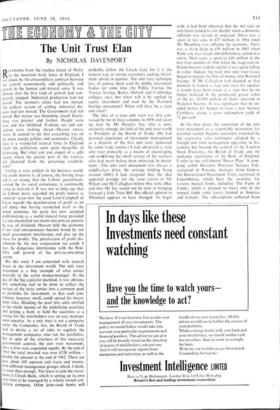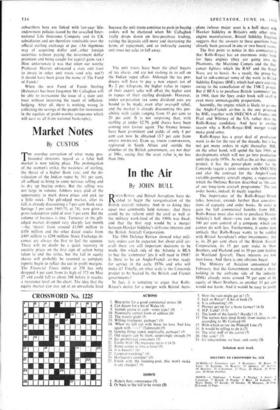- EcaMOIN Th.ri
The Unit Trust Elan
By NICHOLAS DAVENPORT
RETURNING from the treeless island of Malta to the luxuriant leafy lanes of England, I was struck by the extraordinary contrast between our growth economically and politically and growth in the human and natural sense. It was obvious that the first kind of growth had tem- porarily stopped. Industrial production had not moved. The seamen's strike had not moved. The archaic system of settling industrial dis- putes had not moved. The Government had not moved. But nature was bounding ahead. Every- thing was greener and fresher. People were- freer and less inhibited. Fashion, sex and sen- sualism were rushing ahead—Heaven knows sshere. It seemed to me that everything was on the move except politics and economics. Clearly there is a wonderful natural force in England ‘which the politicians seem quite incapable of harnessing. But what can you expect of a split society where the greater part of the workers feel alienated from the governing establish- ment?
Vitality is very evident in the business world. The profit motive is, of course, the driving force and is so strong that the Labour government, worried by its social conscience, is continually trying to restrain it. It was not so long ago that the Labour party regarded the profit motive as immoral—even now the good Lord Campbell of Eskan regards the maximisation of profit as an evil thing—but having reconciled itself to the mixed economy, the party has now accepted profit-making as a useful natural force provided it is not channelled too much into private pockets by way of dividend. Heaven help the economy if our vital entrepreneurs become bored by too much government interference and give up the chase for profits. The penalisation of profit dis- tribution by the new corporation tax could, I fear, be dangerous interference with the flexi- bility and growth of the private-enterprise system.
But this week I am concerned with natural forces in the investment world. The unit trust movement is a fine example of what comes naturally to the active money-manager. As the day of the big capitalist declined, it was obvious that something had to be done to collect the savings of the petty rentier into a common pool or portfolio for investment, so that each con- tributor, however small, could spread his invest- ment risks. Dividing the pool into units entitled to the whole income of the underlying securities and getting a bank to hold the securities as a trustee for the unit-holders was an easy manage- ment exercise.. As a unit trust is not a company under the Companies Act, the Board of Trade had to devise a set of rules to regulate the management companies who run the portfolios, but in spite of the strictness of this necessary government control, the unit trust movement, after a slow start, expanded rapidly. By the end of 1965 the total invested was over £520 million— double the amount at the end of 1962. There are now about 105 separate unit trusts and twenty- nine different management groups, which, I think, is more than enough. The latest to join the move- ment is Lloyds Bank, which is setting up its own unit trust to be managed by a wholly owned sub- sidiary company. Other joint-stock banks will
probably follow the Lloyds lekl, for it is the natural way to service customers seeking invest- ment advice in equities. The unit trust technique has, of course, been used by public investment bodies for some time (the Public Trustee, the Trustee Savings Banks, Oxford and Cambridge colleges, etc.), but when will it be applied to equity investment and used by the National Savings movement? When will there be a state unit trust?
The idea of a state unit trust was first can- vassed by me in these columns in 1958 and taken up later by Mr Douglas Jay, who is now, curiously enough, the lord of the unit trust world as President of the Board of Trade. (He had personal experience of investment management as a director of the first unit trust sponsored by some trade unions.) I had advocated a state unit trust primarily as a means of encouraging and mobilising the small savings of the workers who had never before been interested in invest- ment. (The unit trust movement was always a middle-class drive, the average holding being around £400.) I had imagined that the idea appealed strongly for the same reason to Mr Wilson and Mr Callaghan before they took office and that Mr Jay would not be slow in bringing forward a Unit Trust Bill. But official opinion" in Whitehall appears to have changed. To begin
with, it had been observed that the net sales of unit trusts tended to rise sharply when a domestic inflation was feared or expected. There was a
In the next place, the reputation of the unit trust movement as a responsible instrument for national savings became somewhat tarnished by the aggressive sales techniques adopted by a foreign unit trust management operating in this country but beyond the control of the London Stock Exchange, the Board of Trade and the exchange regulations of the Bank of England. I refer to the well-known 'Dover Plan.' A com- pany called Investors Overseas Services Ltd., registered in Panama, manages from Geneva the International Investment Trust, registered in Luxembourg, which buys the securities for various mutual funds, including 'The Fund of Funds,' which is planned to invest only in the mutual funds (unit trusts) formed in America and Canada. The subscriptions collected from subscribers here are linked with 'ten-year. life- endowment policies issued by the so-called Inter- national Life Insurance Company and its UK subsidiaries and are therefore remittable over the official sterling exchange at par. (An ingenious way of acquiring dollar and other foreign securities without paying the investment dollar premium and being caught for capital gains tax.) How unfortunate it was that when our worthy Professor Merrett advocated a state unit trust to invest in other unit trusts (and why not?) it should have been given the name of The Fund of Funds!
When the new Fund of Funds Sterling (Bahamas) has been forgotten Mr Callaghan will be able to re-examine the issue of a state unit trust without incurring the taunt of inflation- hedging. After all, there is nothing wrong in collecting the savings of the people for investment in the equities of profit-worthy companies which will save us all from national bankruptcy.



































 Previous page
Previous page